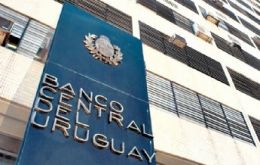MercoPress. South Atlantic News Agency
Tag: Central Bank of Uruguay
-
Wednesday, August 15th 2012 - 23:50 UTC
Uruguay discourages short-term capital inflow to ensure macroeconomic stability

Uruguay's central bank unveiled measures on Wednesday aimed at cooling the local Peso's appreciation by discouraging foreign investment in the bank's short-term debt. To combat the Peso's rise, officials ordered that 40% of new foreign capital invested in central bank bills be frozen in an account at the central bank.
-
Thursday, July 26th 2012 - 20:28 UTC
Uruguay central bank suggests “serene alert” attitude to address global crisis impact

Uruguay must adopt an attitude of “serene alert” given the “uncertainty and uncommon volatility” prevailing in the world said central bank president Mario Bergara, underlining the country has reduced “vulnerabilities” considerably.
-
Tuesday, July 24th 2012 - 06:31 UTC
Uruguay raises banks’ reserves requirements to help bring down inflation

Uruguay's central bank said on Monday it will raise marginal reserve requirements on local and foreign currency deposits from Aug. 1 as part of its efforts to bring inflation within the official target range.
-
Monday, July 16th 2012 - 07:24 UTC
Uruguayan Central bank poll shows economy is expected to grow at slower pace

The Uruguayan economy is set to grow 3.57% in 2012 which is below the government’s forecast according to the latest analysts and businesspeople poll published last Friday by the central bank.
-
Wednesday, July 4th 2012 - 03:04 UTC
Uruguay leaves benchmark rate at 8.75% on persistent concern with inflation

Uruguay's central bank held its benchmark interest rate steady at 8.75% on Tuesday, citing “reasonable” economic growth and persistent concern about inflation expectations above target.
-
Wednesday, June 6th 2012 - 06:27 UTC
Uruguay planning to expand nascent sovereign debt market to improve liquidity

Uruguay wants to expand its nascent local sovereign debt market to improve the liquidity of its securities, said Azucena Arbeleche, the head of the country’s debt management unit at the Ministry of Economy and Finance.
-
Tuesday, June 5th 2012 - 23:34 UTC
Uruguay lost competitiveness for sixth month running in April with main trade partners

External competitiveness of Uruguayan goods dropped for the sixth month running in April because locally produced goods’ prices in US dollars dropped less than those of its main trade partners according to figures released by the Central bank.
-
Friday, May 4th 2012 - 06:19 UTC
Uruguay’s April inflation spikes and remains well above the annual target

Uruguay's annual consumer inflation accelerated in April owing to a big increase in food, clothing and transportation prices, reported the government’s statistics office, INE on Thursday.
-
Friday, March 30th 2012 - 07:11 UTC
Inflation notoriously above the target range, admits Uruguay’s central bank

The Central Bank of Uruguay left its benchmark interest rate unchanged at 8.75% on Thursday, saying the current level is consistent with a restrictive monetary policy as Uruguayan authorities stubbornly battle high inflation.
-
Monday, March 5th 2012 - 05:50 UTC
Uruguayan economy forecasted to expand 4% to 4.5%; inflation main challenge

Uruguay's economy is poised to expand 4% to 4.5% this year, a moderate slowdown from the growth of just over 6% seen in 2011, the president of the central bank Mario Bergara told reporters during an IMF conference held in Punta del Este.
